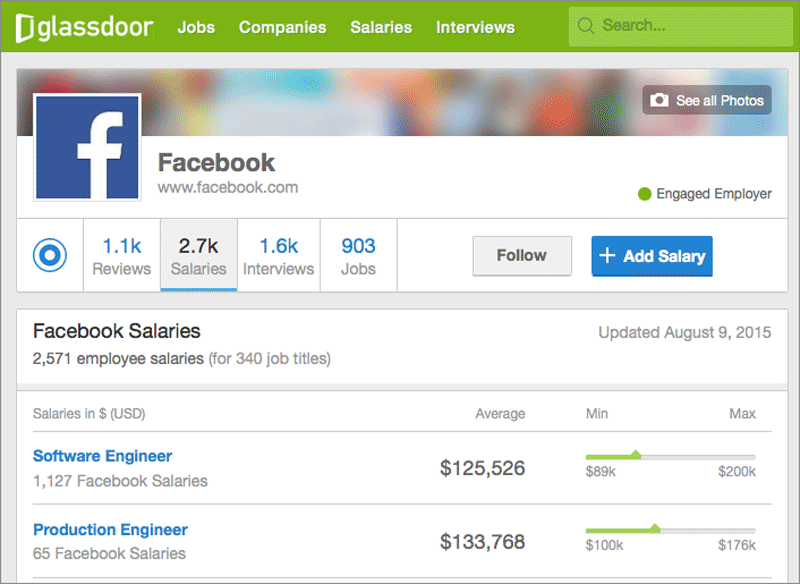How much am I worth?
Welcome to class 2 of the Salary Negotiation Fast Class, where you’ll learn the skills you need to get paid what you’re worth in just 7 days.
The big question.
The first step in a successful salary negotiation does not take place at the negotiation table, but at the computer and out in the field — doing your homework.
So I’m going to ask you one crucial question.
It might seem simple at first, but how you respond to it can speak volumes.
How Much Are You Worth?
Whether you’re negotiating a new job offer or asking for a raise, one of the most important steps is thoroughly researching your worth on the market. Just because you’re in a job making $65,000 doesn’t mean that you’re worth $65,000.
When you know your worth… you can quickly know if an offer is fair or not, know when you’re underpaid for your position, and negotiate from a place of confidence.
When you don’t know your worth… well, this happens:
That’s right. You end up saying “Whatever you want to pay me is just… fine.”
Indicators to Ignore
Let me tell you some of the things that are NOT a factor when trying to find your worth:
- How much your friend from college is making
- How much student loan or credit card debt you have
- How much your rent or mortgage is costing you
- Whether you’re married or single or have kids
- How much you think you deserve

Your boss doesn’t care if your hedge fund buddy is making twice as much as you and just bought a new Tesla. It’s not his problem that you want to move to the nicest part of town or your landlord increased your rent. Yes, getting married or going through a divorce or paying for private school can be expensive. Irrelevant.
If you’re asking for a raise, what matters is this:
- How have you MADE the company money?
- How have you SAVED the company money?
- Do you have a valuable skill that no other employee has?
If you’re going for a new job, what matters is this:
- What is the value of someone with my skills worth on the market for this particular job?
In fact, to some degree, what your past salary history is, or even what you’re getting paid right this very moment, should not have an effect on your worth.
In other words, when you combine your education, your experience, the industry you’re in, the local and national economy, where you live, and package it together with your interviewing skills – along with a little negotiation – what is someone going to actually pay you?
How to research your worth
Most job-seekers will spend a few minutes surfing what I call “The Big 3” websites: Salary.com, Payscale.com, and Glassdoor.com. That’s a great place to start, but a truly prepared candidate takes it a step further to really understand their value… an extra step that pays off.
Note: We’re not trying to end up with an exact number such as $64,689. Rather, we want to consult a cross-section of 5 different resources (all free!), so that you can can be confident about a specific $10,000-$20,000 range during your negotiation.
5 Ways to find your worth
Bonus: For your convenience, I’ve included this outline in a free Salary Tutor Resource Guide download
1) Salary Information Sites
Start with the 3 sites that I’ve mentioned, and enter your relevant information (job title, experience, location, etc.) as a starting point to find out your salary range. Beyond that, there are several additional salary information sites that can help you pinpoint your worth (at last count, I knew of more than 15). The more data you get, the better. Example sites include the Beyond.com Salary Center, CareerBliss, and Salary Expert.
For example, let’s look at Glassdoor. Want to know what it’s like to work at Facebook and how much it pays? You’ll see in a snapshot taken in August 2015, they had 2,700 salaries listed, along with 903 job openings and 1,100 reviews of what it’s like to work there.
2) Job Board Sites
OK, so the job you’re interviewing for doesn’t list a salary range. What to do?
A Careerbuilder.com survey found that about 11% of employers DO include wage or salary information in their job listings. So what you can do is search online job boards for positions with a similar title, responsibilities, and location.
For example, let’s say you’re applying for a social media marketing job at a company in Boston, but don’t know what the salary range is.
Search for social media marketing jobs on job boards (I can recommend dozens), and you may find the following:
- One listing on Indeed.com with a range of $60-$65,000
- One listing on Monster.com with a stated salary of $55,000
- Another listing on Craigslist at $29 per hour (~ $58k per year)
It’s a small sample and you’ll want to adjust for location and experience, but it gives you a good idea that you’re in the $55-$65k range.
3) Industry Salary Guides
Independent research companies and trade groups often produce salary guides that reveal the latest compensation data and trends for your specific industry.
And it’s not just salary guides for marketing managers or IT pros. Take the dental industry for example. I’ve found sites listing salaries specifically for Dental Assistants, Hygienists, Lab Technicians, and Orthodontists.
Go to Google and type:
- [name of your industry] + “salary guide†or
- [job title] + “salary guideâ€
4) Internal Networking
OK, so you’ve done a great job so far researching salary ranges online. However, that’s just half the battle. At some point you need to emerge from behind the glowing laptop screen, go out into the world, and talk to real people.
Start with people you know. Reach out to your network of family, friends, and former co-workers that can offer feedback. By networking with real people in your industry, you can show them the data you’ve collected thus far, consider the nuances of your particular situation, and narrow down your range even further.
5) External Networking
Finally, expand out to people you don’t know. Seek out resources beyond your personal network that can provide objective feedback for your job search data.
Places to find industry professionals include meetup groups, job fairs, and recruiters.
For example, I’ve found meetup groups usually have a great mix of people… some will be new to the group and just starting their careers, so they’ll be in the same boat as you. This makes it easy to make friends and compare notes.
Others will be industry veterans that are really into what they do. Go up to one and tell them that you’re new to the field and were hoping they could give some advice. Most people love talking about their career path. At some point in the conversation, share some of the salary research you’ve found and ask if they think you’re on track.
Class 2 Summary
When it comes time to find out your worth, it shouldn’t be a guessing game. Knowledge is power, and the more research you do, the more confident you’ll be. Go beyond what the average candidate looks for, and take the time to get a solid cross-section of numbers so that you can accurately determine your worth on the market.
Fast Class Agenda:
[Class 1] Earning more starts with a negotiation mindset
[Class 2] How much am I worth?
[Class 3] To earn more money, bring these documents to your interview (Hint: it’s not your resume)
[Class 4] What to say when asked for your salary requirements
[Class 5] Negotiation phrases that pay
[Class 6] Will you back down first in this negotiation showdown?
[Class 7] The Aha moment of Salary Negotiation Success


